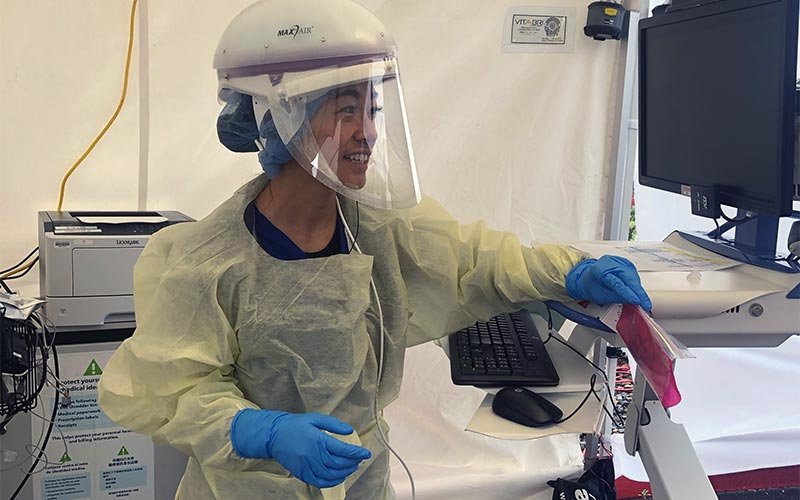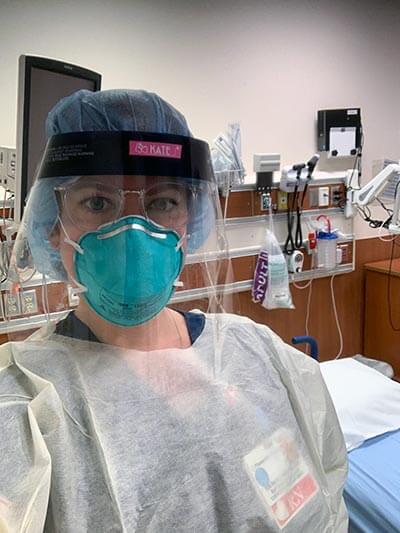
While people wait in long lines at Costco for their toilet paper, Christine Vu waits in a similarly long line to get her temperature checked before beginning a 12-hour shift in the Emergency Department at Kaiser Permanente Irvine.
Vu, a Cal State Fullerton assistant professor of nursing and practicing nurse, is one of 10 School of Nursing faculty members on the battleground of the COVID-19 pandemic.
A Day in the Life of an Emergency Nurse
On the days she works with patients, Vu typically wakes up between 4:30-5 a.m., gets her coffee (“I love my coffee and try my best not to miss out on the little things in life that I enjoy.”) and heads to the hospital. She puts on her shoes and scrubs at work, and no longer brings any extra personal belongings to the hospital.
“I prepare myself for each shift by reminding myself that this is the occupation I chose and that I need to have courage, follow my instincts, use my professional judgment and provide the best care I can provide to any patient, COVID-19 or no COVID-19,” she shares. “There are no shortcuts to providing quality care as a nurse.
“Some days are extremely frightening,” says Vu. “We have patients who present symptomatic, and we also have patients who test positive for COVID-19 but do not present with any symptoms. This is terrifying for us because of the risk, the expectations and the unknown.”
During her lunch break, Vu takes a walk around the hospital since she no longer has access to gyms or group classes. “It’s nice to have a little fresh air and a moment free from wearing our personal protective equipment.” After her shift, she heads home, immediately showers and washes anything she brought to the hospital.
Then, she turns her attention to teaching and responding to student emails in her “Theory for Critical Care Nursing” and “Critical Care Clinical” classes.
“I do my best to continue interactions with students despite our lack of face-to-face class time,” she says. “My aim is to provide students with the same education I would have provided to them if we were to meet in person.”
Vu, who holds a Master of Science degree in nursing from CSUF and a Doctor of Nursing Practice degree from Rush University, says her goal as an instructor is to ensure that students leave her classroom with the knowledge and skills to be critical thinkers in today’s nursing world.
“I have had many heart-to-heart moments with patients during this national health crisis, and if given the chance, I would like to use these stories as teaching moments for my students,” she explains. “I take every precaution in speaking to my students with positivity because I do not want to create more stress or fear for them as the future of nursing. I am fortunate that my students share a common purpose and passion for wanting to care for other people.”
Vu spends her days off at home, isolating from her family due to the high-risk nature of her work, tending to her plants and caring for her own health.
“I have made the conscious and very difficult decision not to have any interactions with my family and friends, but I never feel alone in this pandemic crisis,” she says. “I do have days that are more challenging than others, so I have slowed down to acknowledge when I need rest and when I leave a shift feeling scared.”
Asked what the public can do to support health care professionals during this time, Vu shares three ways:
- Keep an attitude of optimism.
- Respect such guidelines and recommendations as social distancing, droplet precaution, self-monitoring, hand washing, cleaning and disinfecting.
- Advocate for or donate such personal protective equipment as N95 masks, surgical masks, face shields, shoes, head covers, caps and eye protection.
Putting Her Nurse Training to the Test

Another Cal State Fullerton faculty member, Kate Bayhan, has quarantined a section of her home, where she can shower and change every time she returns from a shift in the emergency department of a local hospital.
In addition to being an emergency nurse and a lecturer in nursing, Bayhan is a mother of young children and worries about the risk she brings to her family.
“My daily activities put me in contact with COVID-19 patients as I triage, assess and provide critical interventions when needed,” says Bayhan ’05, ’10, ’19 (B.A. English, B.S. and M.S. nursing, DNP), a four-time Titan alumna. “I must ensure meticulous attention as I don and doff protective gear, for the safety of my patients, myself and my family.”
Though she sees fewer patients these days because of proactive social distancing, Bayhan says those who do seek medical attention often are critically ill. To ensure patient safety, the hospital she works in created an external triage/screening area for less critical patients as well as the screening of all hospital employees.
“As an emergency nurse, I go to work each day with a somber respect for the impact of this pandemic,” she says.
While no amount of education could fully prepare her for this pandemic, Bayhan says her training at CSUF taught her to understand and interpret what she is seeing in the clinical setting and quickly respond to achieve the best patient outcomes.
“Coupled with hands-on experience, I learned to think critically under great pressure and to trust my judgment,” she says. “My education has empowered me to work as an invaluable member of an interdisciplinary health care team.”
Bayhan, who is teaching a total of 15 units this semester — “Capstone Nursing Practicum,” “Health Assessment” class and lab, and “DNP Clinical Practicum” — has transitioned her classes into virtual learning forums. She remains sensitive to the fact that her students face challenges beyond school, such as child care, work demands, unemployment, and even illness and injury.
“Following this pandemic, I imagine that Americans will view nurses as a more critical force in a cohesive health care team,” reflects Bayhan. “I believe that the lessons I will bring back to the classroom will include stories of grace, fortitude and perseverance.
“As I teach a new generation of nurses, my message will be one of accountability, not only for one’s education, but for one’s impact in a world of uncertainty.”